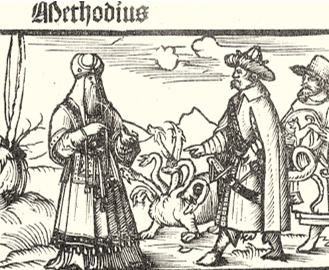
Seminar: “Exegesis Between Empires: The Prophecies of Daniel and Political Theology in the Apocalypse of Pseudo-Methodius”
Christopher Bonura (Mellon Fellow, PIMS)
The Apocalypse of Pseudo-Methodius is one of the earliest and most important Christian literary sources to emerge from the Middle East after the rise of Islam. Composed in the Syriac language in the late seventh century, it was soon translated into Greek, Latin, and many other languages. Rather than merely a description of the last days, it presented a history of the world from creation to the end the time, with an emphasis on the rise and fall of great empires. Scholars have noticed that the Apocalypse of Pseudo-Methodius engages with the prophecy of four successive world empires found in the Book of Daniel in the Old Testament. Most scholarship, however, assumes that it presented the standard Byzantine interpretation of these prophecies from the Book of Daniel, and that this interpretation celebrated Byzantium as the last and greatest of empires. Some have even suggested that the Apocalypse of Pseudo-Methodius should be understood in the context of Byzantine imperial propaganda.
This paper, however, will argue that the Apocalypse of Pseudo-Methodius drew on a distinctive interpretation of the Danielic prophecies previously found almost exclusively in the works of late antique Syriac authors writing from the eastern imperial borderlands and in the Persian Empire. The Apocalypse of Pseudo-Methodius updated this interpretation of the succession of world empires in light of the recent Arab conquest of the Middle East. It did not imitate Byzantine models; instead, the translation of the Apocalypse of Pseudo-Methodius into Greek caused its theory about the succession of empires to influence Byzantine authors. Further, after the Apocalypse of Pseudo-Methodius was translated into Latin, its theory came to have a profound impact on Western European authors, leaving a noticeable impact on mediaeval and early modern discourse about royal authority and empire.
This event is taking place in person. All COVID-19 related University protocols will be in place and adhered to.


